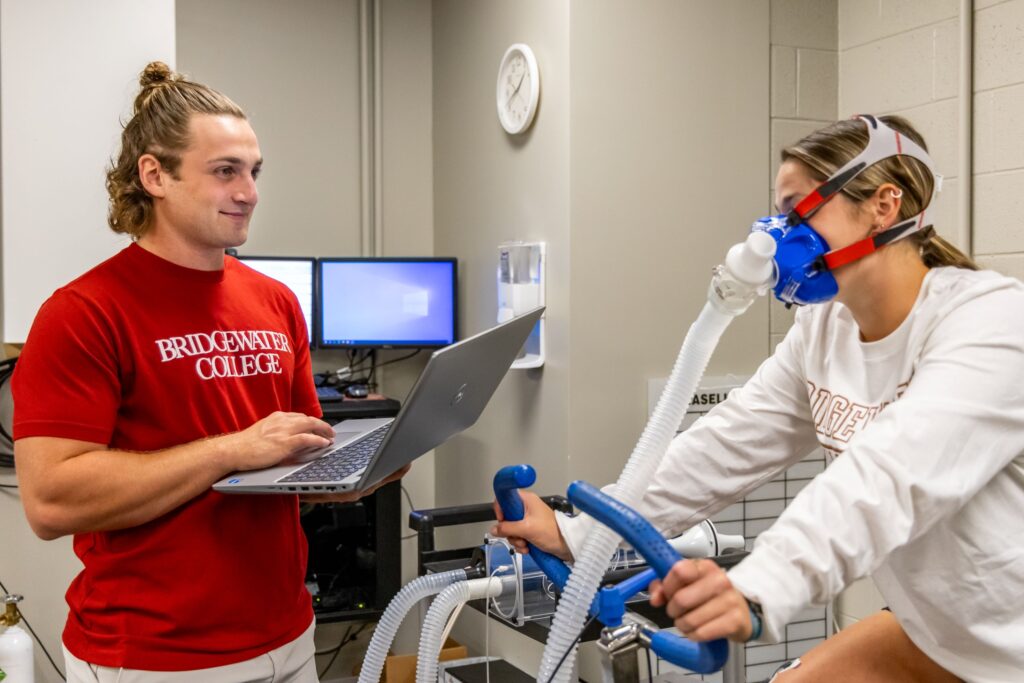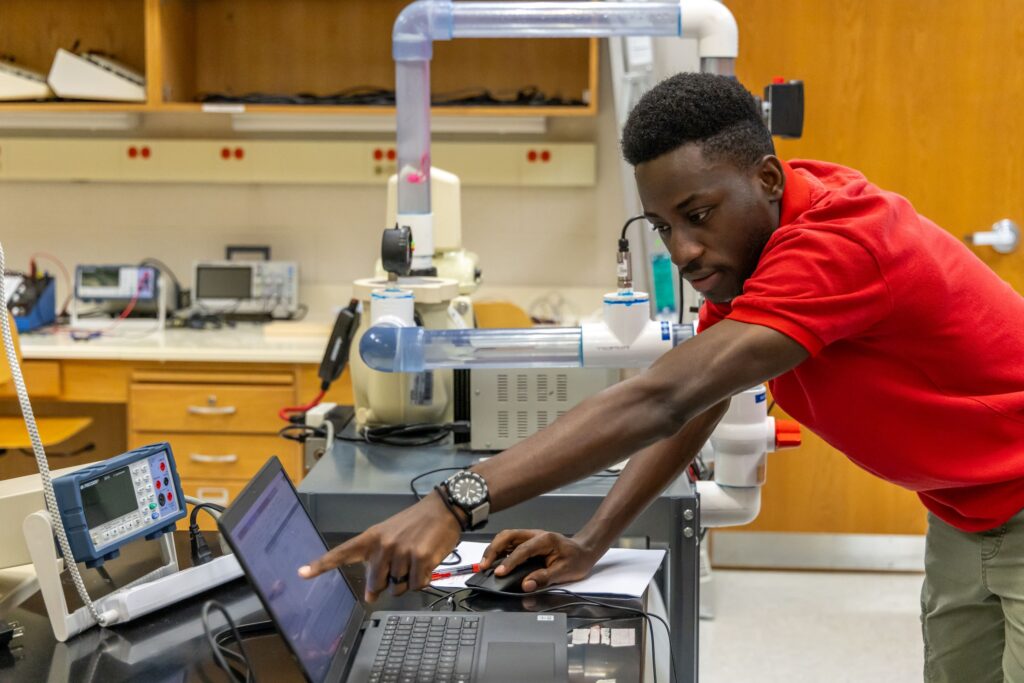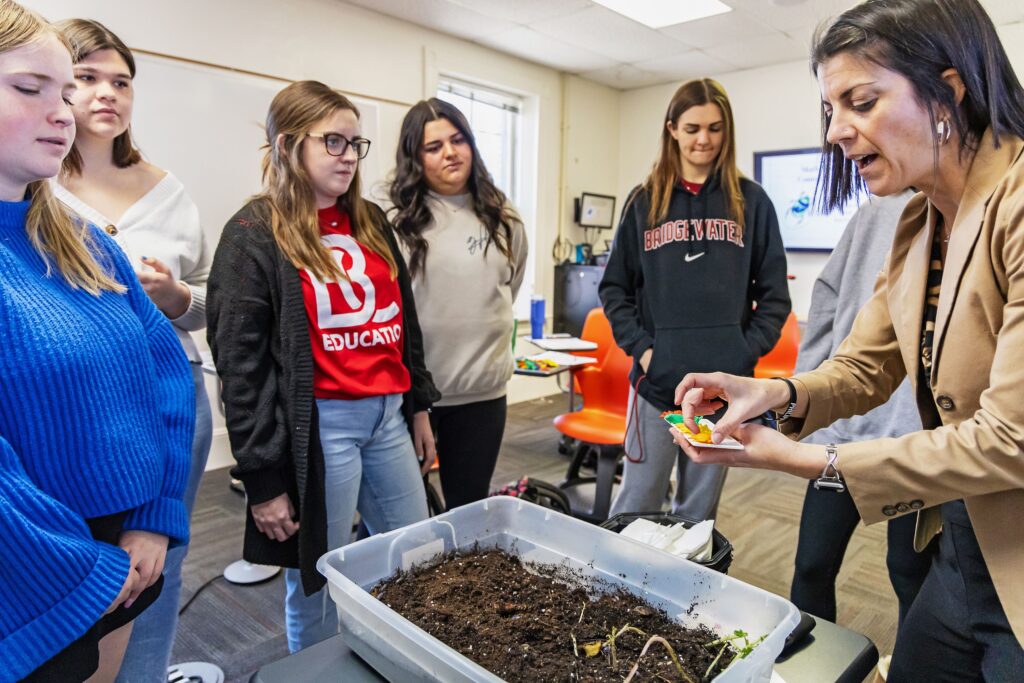[Story originally published in Bridgewater magazine (spring/summer 2024) as: Transformational Experiences: Making the Foundational Connections in Teaching and Learning.]
What makes the Bridgewater experience special? It’s the first-year student who gets the chance to work on a research project with her professor outside of class. It’s the faculty mentor who inspires hundreds of students, some of whom go on to work on life-changing research of their own. It’s the donor who remembers the impact of a particular class and wants future students to have access to the education that changed his life.
It might seem obvious that teaching and learning is at the foundation of the college experience. But what makes a college education truly transformational?
For Lucas Bauer ’25, a health and exercise science major, his transformational experience was spending the summer of 2023 working with Assistant Professor of Health and Human Sciences Dr. Robert Shute on a research project in exercise physiology. Funded through The Research Experience at Bridgewater (TREB), the six-week-long project gave Bauer the opportunity to learn in depth about the process of research and data analysis, with Shute mentoring him every step along the way. Bauer called TREB a once-in-a-lifetime experience that taught him the value of problem-solving and perseverance.
“The real-life application is something that classes in school cannot quite teach you,” Bauer said. “I think everyone should do it if they have the opportunity.”

According to Provost and Executive Vice President Dr. Leona Sevick, academic experiences outside the classroom are critical to a college student’s development. This summer alone, student-faculty pairs pursued research projects in history, tabletop game design, literacy education and artificial intelligence applications in business. High-impact programs such as these are opportunities that actively connect what a student is learning in the classroom with real-life experiences. Internships, clinical immersions and studying abroad can be critical in giving students practical experience as a foundation for their future careers or a new perspective on the world around them.
“No other high-impact practice prepares them better for the work world, where they can translate their work in the classroom to the kind of vocation that they may pursue in the future,” Sevick said of internships. “These are the experiences that students remember.”
Even in the classroom setting, Sevick said that Bridgewater faculty are constantly modeling an approach of exploration and curiosity about the application of concepts in the real world with their students. The focus is on discussion and interactive assignments, and faculty encourage students to go beyond memorization of primary concepts and delve into learning how to apply them.
Although everything from technology and classroom design to the class materials plays an important role in student learning, Sevick said there is no substitute for faculty who are confident and excited about how they’re teaching and what they’re teaching.
“The most important piece for a student to flourish in the classroom is an enthusiastic, engaged professor,” Sevick said.
But how do faculty maintain that enthusiasm and engagement over the years? According to Bridgewater President Dr. David Bushman, the answer is faculty development.
“Great teachers aren’t born; they’re made,” Bushman said. “They become great teachers because they had the opportunity to develop.”
Colleges invest in faculty development because it’s critical for faculty to stay current on advances in their field. Through conferences and opportunities to engage in scholarship, they not only have time to devote to their own research, but they are also able to meet and share ideas with colleagues. These ideas may inspire a new way to design a program, refine a research topic or spark a classroom discussion.
Bridgewater students and faculty can take advantage of these high-impact and transformational experiences thanks, in large part, to funding from donors. Naming and endowing the College’s schools has been a key source of funding to support teaching and learning. The Bonnie Forrer and John Harvey Rhodes School of Arts and Humanities, named by Bonnie Rhodes ’62 and her late husband John in 2021, and the Rev. Wilfred E. and Joyce A. Nolen School of Business and Professional Studies, named by the Nolens in 2023, provide funds for faculty development and a variety of real-world learning opportunities.

The Early Innovation Fund, established by Mary ’65 and Paul Early, allowed the College to launch the engineering major. Their commitment, furthered by generous matching gifts from the Texas Instruments Foundation, is enabling creative and inventive program development at Bridgewater, ensuring its academic offerings remain relevant and attractive to prospective students.
In addition to supporting research, internships and opportunities to study abroad or away from campus, donor funding also enables faculty to take students to professional conferences, where they can discover opportunities for graduate study, network with those established in the field and even present research.
Rev. Wil Nolen ’63, donor and longtime member of the College’s Board of Trustees, said of the school naming gift, “We are proud and happy to support Bridgewater College and the difference it makes in the lives of students and faculty through its excellent academic programs and extracurricular opportunities.”
– Olivia Shifflett
Bridgewater magazine, spring/summer 2024
[Story originally published in Bridgewater magazine (spring/summer 2024) as: Transformational Experiences: Making the Foundational Connections in Teaching and Learning.]


